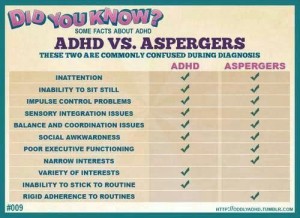
Counselors near you are able to differentiate between aspergers and ADHD and create a treatment plan
Diagnosing Asperger’s vs ADHD can be clinically difficult. Children diagnosed with Asperger’s Disorder and Attention Deficit Hyperactivity Disorder (ADHD) have many similarities at first glance. Both can manifest problem behaviors, inattentiveness, sensory integration problems, poor coordination and impulsivity, and both respond positively to structure and routine.
Given that these disorders share so many similarities, accurate diagnosis is challenging. In fact, the National Institutes of Health estimates that 60% to 70% of children with Asperger’s are initially misdiagnosed with ADHD.
While children with both disorders manifest problems with attention, careful observation often reveals that the attention problems in Asperger’s are quite different from that of ADHD. For instance, in Asperger’s disorder, attention problems are attributed to a need for structured routines, language difficulties, obsessive rituals and self stimulating behaviors. ADHD, on the other hand, compromises a child’s attention by disrupting the way information is processed in the central nervous system producing hyperactivity and impulsivity.
Some other differences between Asperger’s and ADHD include:
- Children with Asperger’s have the ability to focus on an activity of interest, usually one activity that excludes everything else in his environment. Asperger’s children tend to focus on this one activity for long periods of time. With ADHD, a child tends to focus on multiple activities but is easily distracted by his/her environment and jumps from one activity to another.
- A child with Asperger’s can talk or play quietly. A child with ADHD finds it difficult to play or talk quietly.
- A child with Asperger’s may get upset if his routine or favorite activity is disrupted, but does not normally show a lot of emotion in public. With ADHD, a child will express emotions directly and clearly.
- Both Asperger’s and ADHD children have difficulties socially, especially when making friends. With Asperger’s the child’s behavior is, at times, unusual or idiosyncratic so that the child is viewed as “weird” or “eccentric.” With ADHD, the child’s behavior is very loud and chaotic and the child is viewed as “annoying” or “disruptive” to his peers.
- Children with Asperger’s can be oppositional or defiant when trying to avoid something that makes them anxious or uncomfortable. Children with ADHD are at times oppositional or defiant in an attempt to seek attention.
While Asperger’s Disorder and ADHD have many similarities on the surface and can both result in behavioral and social difficulties, it is essential to look beyond these similarities and distinguish between them so that the right diagnosis can be arrived at and the proper help can be offered. Structured diagnostic evaluations and assessments are available that can assist in the appropriate diagnosis, intervention and treatment for each individual.


